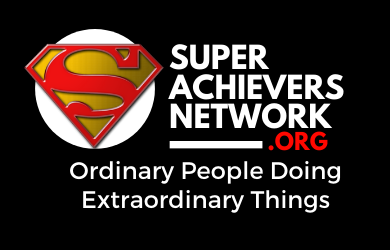How Super Achievers Develop Emotional Intelligence

Emotional intelligence (EQ) is the ability to tap into your emotions and use them to make your life better.
There are volumes of books written on the topic, and this is not a compressive coverage of the topic. However, this article will give you some quick tips on the methods you can use to develop your emotional intelligence.
It involves being in touch with your feeling allowing you to manage stress levels better. It also helps you communicate effectively with others without the wrong emotions getting in the way.
Learning both of these skills will enhance your life both personally and professionally.
Unlike IQ, which remains constant throughout your life, EQ can be developed and honed over time.
Try some of the steps below to get started developing your emotional intelligence.
1
Note Your Emotional Reactions

Awareness is always a good place to start. Take note of emotional reactions to events throughout the day. Most people don't really pay attention to their feeling throughout the day.
Taking some time to acknowledge how you feel about experiences is essential to improving your EQ. This information has a big effect on your mindset and the way you behave.
Getting into the practice of naming your emotions as sadness, embarrassment, joy, contentment, or any other number of feelings will start raising your emotional intelligence right away.
Get into the habit of tapping into your emotions at certain time every day.
2
Pay Attention To Your Body Language

Emotions can have an effect of your physical body. Pay attention to your body and start watching the physical reactions to certain emotions.
Our minds and bodies are not separate, they affect each other quite deeply.
You can raise your EQ by learning how to read physical clues that clue you in to what emotions you're feeling.
- Stress might feel like a knot in your stomach, tight chest, or quick breathing
- Sadness might feel like waking up with slow, heavy limbs
- Joy, pleasure or nervousness might feel like butterflies in your stomach, a racing heart, or increased energy
3
A Observe The Connection Between Your Emotions and Your Behavior

Observe how your emotions and behavior are connected.
When you feel strong emotions, how do you react? Tune into your gut responses to situations you face everyday, instead of just reacting without any reflection.
The more you understand what spurs your behavioral impulses, the higher your EQ will be. You'll be able to use what you already know to actually change your behavior in the future.
Here's some examples:
- Feeling embarrassed or insecure might cause you to withdraw from the conversation and disconnect.
- Feeling angry might cause you to raise your voice or angrily stomp away.
- Feeling overwhelmed might cause you to panic and lose track of what you were doing, or cry.
4
Avoid Judging Your Own Emotions

All emotions you have are valid, even if they are negative ones. Don't judge your emotions. When you do, you inhibit your ability to fully feel, making it more difficult to use your emotions in positive ways.
Think of this, every emotion you have is a new piece of useful information connected to something happening in your world.
Without this information, you'd be left in the dark about how to adequately react. That's why the ability to feel your emotions is a form of intelligence.
- It's hard at first, but practice letting negative emotions surface, and connecting to what's happening. For example, if you feel bitterly envious, what is that emotion telling you about your situation?
- Fully experience positive emotions, too. Connect your joy or satisfaction to what's happening around you, so you can learn how to feel them even more often.
5
Notice Patterns In Your Emotional History

Another way to learn as much as you can about your own feelings is to notice patterns in your emotional history.
Review you past experiences and recall the feelings involved in the situation. Figure out if there is a connection between the feelings and your experiences.
When you have a strong emotion, ask yourself when you last felt like this. What happened before, during, and after?
Observe how you handled situations in the past and notice any patterns. Note how you handled a certain situation before, and decide how you'd like to handle it the next time it occurs.
Keep a journal of your emotional reactions, or how you feel from day to day, so you can clearly see how you tend to react.
6
Practice Deciding How To Behave

You can't help what emotions you feel, but you can decide how you want to react to them. If you have an issue with lashing out in anger, or shutting down when you're hurt, think of alternative ways to react.
You have the power to decide how you will react. As a matter of fact, you can actually practice deciding how you will behave in certain circumstances.
Communicate your feelings in a way that you feel represent that situation well. Don't suppress strong emotions whether they are good or bad. Feel them, but direct them in an intelligent way.
7
Practice Being Emotionally Honest

Practice being emotionally honest with yourself. If you say you're fine and have a nasty scowl on your face, you're not communicating honesty.
In order to control your emotions, you have to acknowledge exactly what they are. Be honest with yourself, and with others about the way you're feeling.
That's how they get to know you, and understand where you're coming from.
Honestly acknowledging your feelings helps you figure out the best way to handle them in a way that gets your point across without hurting others in the process.
8
See Where You Can Improve

Being intellectually capable is important in life, but being emotionally intelligent is just as essential.
Having high emotional intelligence can lead to better relationships and job opportunities.
There are four core elements to emotional intelligence that help you lead a balanced life. Read this over and decide where you might have room for improvement.
Four Core Elements To Emotional Intelligence
- Self awareness: The ability to recognize your own emotions for what they are and understand their origins. Self-awareness means knowing your strengths and limitations.
- Self management: The ability to delay gratification, balance your needs with those of others, take initiative and to pull back impulsivity. Self-management means being able to cope with change and stay committed.
- Social awareness: The ability to be attuned to other people's emotions and concerns, as well as being about to notice and adapt to social clues. Being socially aware means being able to see the power dynamics at play within any group or in any organizational context.
- Relationship management: The ability to get along well with others, manage conflict, inspire and influence people and to communicate clearly.
Examine these area and decide where you could use some improvement.
9
Lower Your Stress Level By Raising Your EQ

Dealing with stress is something that we are all familiar with. Stress is just a catchall word for feeling overwhelmed by a variety of different emotions.
Life is filled with difficult situations from relationship breakdowns to job loss and everything in between.
Having a plan for relieving stress will help you improve all aspects of your emotional intelligence.
Figure out what triggers your stress, and note what to do to relive it. Make a list of effective forms of stress relief and put it to good use.
If your stress seems so overwhelming that you can't deal with it alone, seek the help of a therapist or psychologist who can give you some tools to cope.
10
A Be More Light-hearted At Work and At Home

Finally, try being more light-hearted at work and at home. When you're optimistic and light-hearted, you have a tendency to easily see the beauty in life.
Other people want to be around an optimistic person and this draws them to you. Having more connections create greater opportunities for you.
People with high EQ tend to know how to use fun and humor to make themselves feel safer and happier. Use laughter to get through tough times, and keep your spirits high.
Conclusion

Emotional intelligence (EQ) is the ability to tap into your emotions and use them to make your life better.
The first place to start is being aware of your own emotions and seeing how you can use them to your advantage.
Pay attention to your body language to see if certain physical characteristics are directly associate with your emotions.
Start looking for patterns of emotional expression that you display. Just let them flow without judging them. If you see patterns you've developed, make a plan for how you will handle them.
Be honest with yourself, and acknowledge what you are feeling. That's the only way to determine how to deal with improving your emotional intelligence.
The more time you spend working to build more emotional intelligence, the more you lower your stress level.
Finally, be more light-hearted at work and at home.
Following these steps will help enjoy your emotional side of things making you able to enjoy all the beauty that life has to offer.
You can do it.
After all, you are
"SUPER"
("Seriously Unstoppable Person Earning Respect")
Question?
What emotions do you have a hard time controlling?
(Leave your answer below)
Watch This Video for More Inspiration

Get More Tips For Achieving Your Dreams
Sign Up Today!
Albert Powell
Thank You
Hope it helps you in some way.
Please post a comment below, and let me know what you think.
Share it with the Super Achievers you know, and join our mailing list for more helpful tips.
The information you share with someone could be the difference between success and failure in their life.
And remember,
"Make something great happen today."

